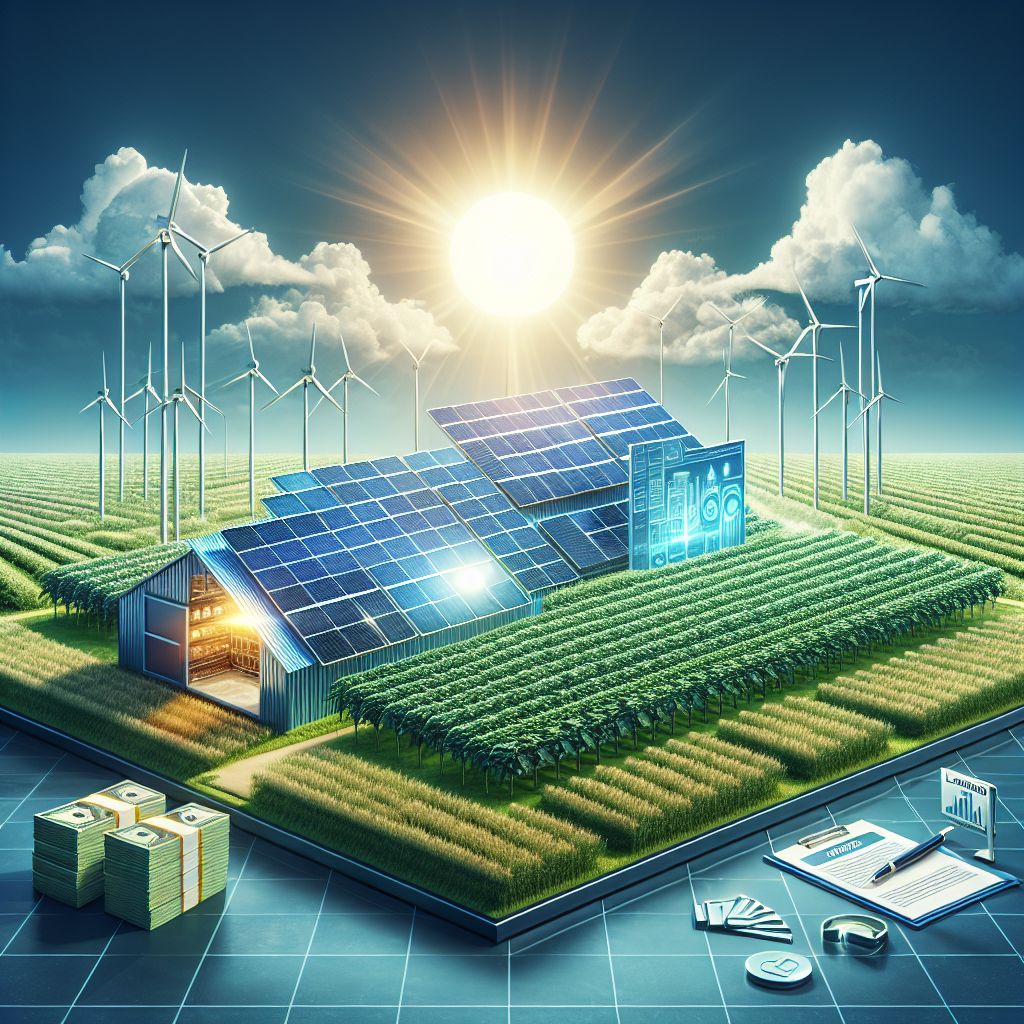
Key Takeaways
Financing solar panels can significantly decrease energy expenses and enhance self-reliance for agricultural operations.
Purchasing solar panels entails an initial investment but provides long-term savings and potential tax advantages.
Leasing solar panels can be a low-risk alternative, but may offer less financial gain over time.
Solar loans provide a compromise between immediate affordability and eventual ownership.
Comprehending the terms and options for solar panel financing is essential for making a knowledgeable choice that aligns with your farm’s financial objectives.
Unlocking Solar Panel Financing
As an agriculturalist, you’re perpetually searching for methods to reduce expenses and increase efficiency. Solar panels can revolutionize your farm’s irrigation system, providing not only energy savings but also a move towards sustainable agriculture. But, let’s be honest, the initial cost can be a barrier. That’s where financing comes into play, and I’m here to guide you through the complexities of purchasing, leasing, and loans for solar panels.
Unveiling the Benefits of Solar Investment for Your Farm
Investing in solar panels is not just about going green; it’s a savvy financial decision. When you install solar panels for your farm’s irrigation system, you’re looking at drastically reducing your utility bills and, in some cases, even selling surplus power back to the grid. Plus, you’re shielded against increasing energy costs. But the question is, how do you pay for it? Let’s find out.
Things to Consider Before Making a Commitment
Before you put pen to paper, it’s crucial to know the energy requirements of your farm, the size of the solar panel system, and the possible cost savings. You should also think about the tax benefits and rebates in your area, as these can greatly influence your financing decision.
Here is a table comparing solar panel financing options for an irrigation system on a farm:
|
Financing Option |
Description |
Pros |
Cons |
Relevant Sources |
|---|---|---|---|---|
|
Buying |
Farmer purchases the solar panels outright |
– Farmer owns the system and can sell excess power back to the grid 3 |
– High upfront costs can be prohibitive for many farmers 1 – Farmer is responsible for maintenance and repairs | |
|
Leasing |
Farmer leases the solar panels from a developer |
– Low or no upfront costs for the farmer 3 |
– Farmer does not own the system and cannot sell excess power 3 | |
|
Loan |
Farmer takes out a loan to purchase the solar panels | – Farmer owns the system and can sell excess power back to the grid 3 |
– Requires a down payment and monthly loan payments 1 |
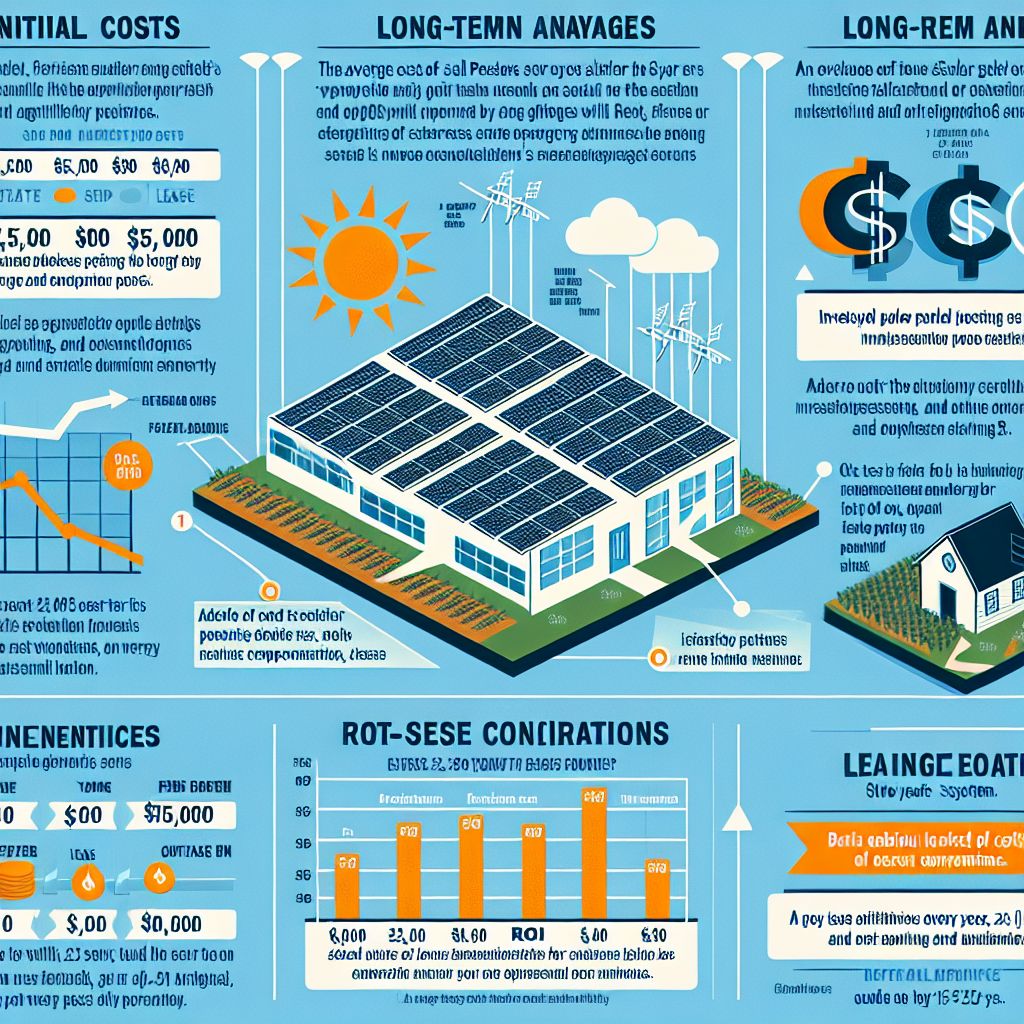
Purchasing Solar Panels: A Detailed Cost Analysis
Upfront Expenses and Long-Term Advantages for Your Agricultural Business
Buying solar panels can seem like a big investment at first. However, don’t be put off by the initial cost. Over time, owning your solar panels can lead to significant savings. For instance, the average cost of a solar panel system for an irrigation setup might be between $15,000 and $20,000, but the long-term advantages could outweigh this initial outlay.
Buyers Can Take Advantage of Incentives and Rebates
The upside is that there are usually financial benefits to going solar. These can include federal tax credits, state rebates, and even grants just for farmers. For example, the federal solar investment tax credit (ITC) allows you to deduct a percentage of the cost of installing solar panels from your federal taxes.
Depreciation and Return on Investment Explained
Like any other asset, solar panels depreciate as they age. However, they are also a sound investment with a strong return on investment (ROI). Solar panels typically last 25-30 years, and most systems recoup their costs in 5-10 years, depending on energy consumption and local electricity prices.
Choosing to lease solar panels can be an attractive choice as it frequently requires little or no initial investment. But, it’s important to scrutinize the details of the lease agreement. These contracts can span anywhere from 10 to 25 years, and they typically include stipulations about what occurs when the lease is up. It’s crucial to understand if you’ll have the ability to purchase the panels, extend the lease, or if they’ll be taken down at the cost of the lessor.
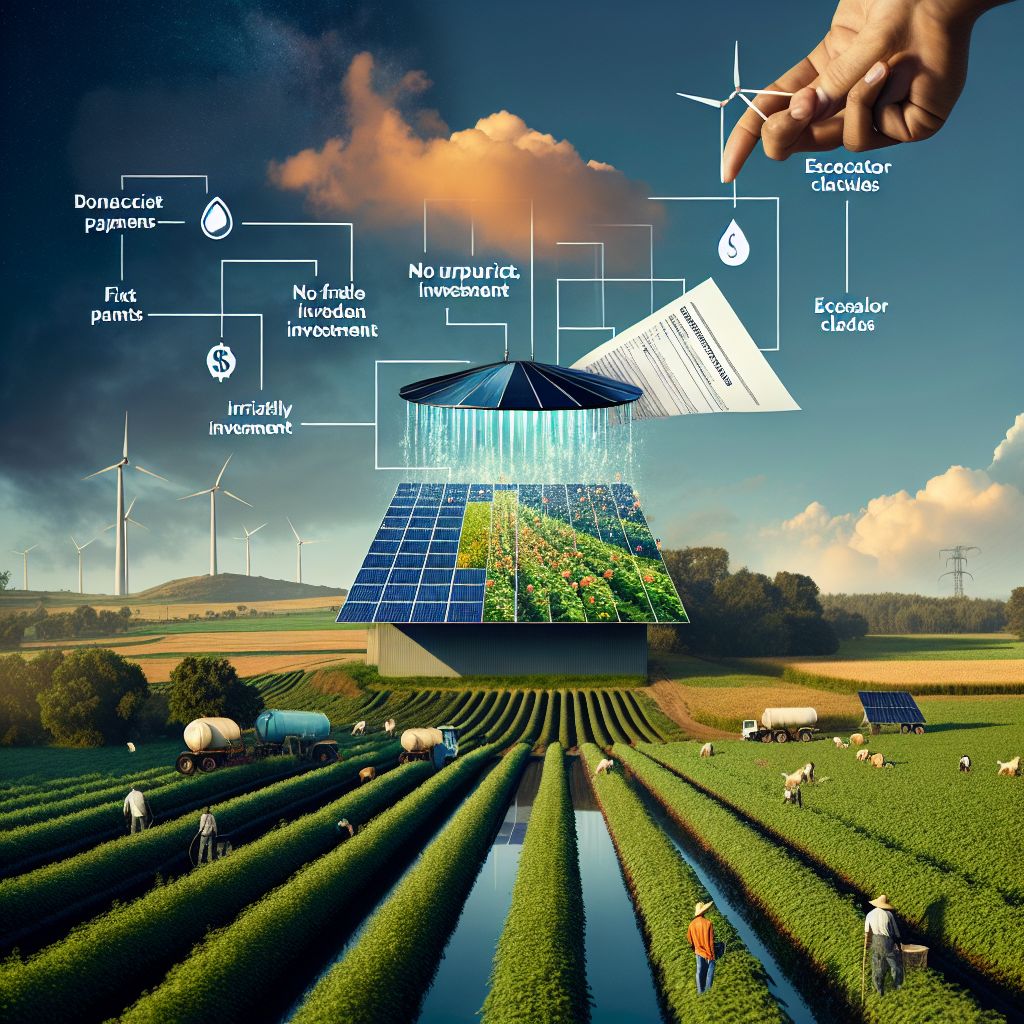
Leasing Solar Panels: A Flexible Alternative
Leasing solar panels for irrigation systems on farms offers a flexible and cost-effective alternative to traditional energy sources. With reduced energy costs, fixed payments, and no upfront investment, farmers can enhance their crop yields while minimizing their financial burden. By partnering with a reputable solar installer, farmers can harness the power of the sun and secure a more sustainable and profitable future for their operations
Understanding Lease Terms and Conditions
Leasing basically means that you are renting the equipment, so the leasing company still owns it. This could affect your farm’s financial flexibility. For instance, you can’t claim tax credits or rebates because you don’t own the equipment. Also, leases often have escalator clauses that can raise payments over time, so it’s important to consider this in your long-term budgeting.
Can You Really Save Money Every Month?
Many lease agreements claim that you’ll see immediate savings on your energy bills. While it’s true that your monthly lease payment might be less than your current energy bill, you need to consider the total cost over the term of the lease. Sometimes, the savings aren’t as substantial as they first appear, especially if there are annual increases built into your lease payments.
Understanding the Fine Print: What to Look Out For
Be cautious of the fine print in any lease agreement. Pay close attention to terms about system performance, maintenance responsibilities, and insurance. Knowing who is responsible for repairs or damage to the panels during the lease term can prevent you from unforeseen costs later on.
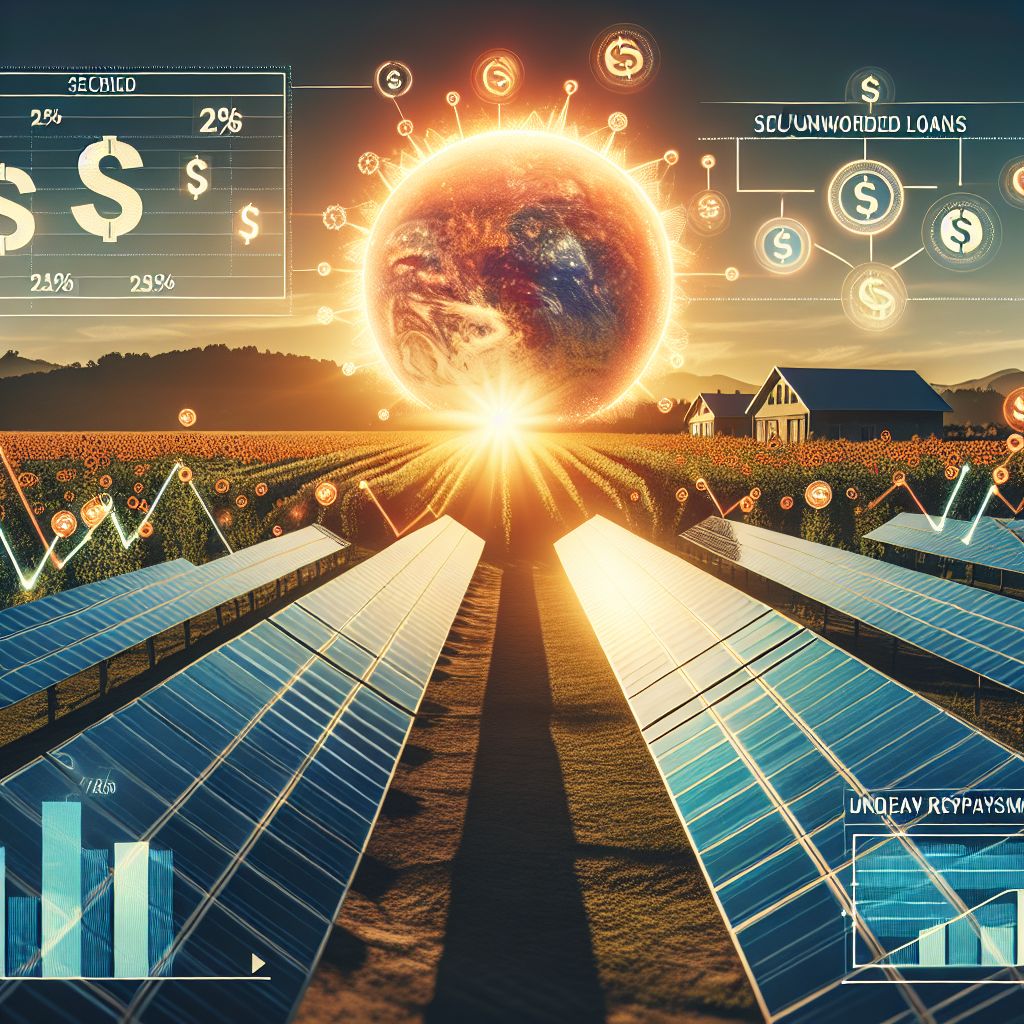
Solar Loans: Funding Your Energy Needs
Solar loans provide a middle ground between leasing and buying. You can enjoy the perks of owning, such as tax credits and a boost in property value, without having to shell out the full amount right away. Loans can either be secured, where your property serves as collateral, or unsecured, which usually involves higher interest rates but less threat to your assets.
Comparing Secured and Unsecured Loans
Secured loans usually have lower interest rates because the lender has the assurance of your property. On the other hand, unsecured loans are riskier for lenders, making them more costly for you, but they don’t tie up your property. It’s essential to consider the benefits and drawbacks of each, taking into account your farm’s financial situation and future plans.
Understanding Interest Rates and Payment Plans
The interest rate on your solar loan will play a big role in your monthly payments and the overall cost of the loan over its lifespan. A lower interest rate means a lower overall cost, but it may come with more stringent eligibility criteria. The payment plan you choose will also affect how quickly you pay off the loan and start seeing the full financial benefits of solar power.
For instance, a solar loan with a 4% interest rate and a 15-year term may appear manageable, but it’s crucial to calculate the total interest paid over those 15 years in comparison to a shorter-term loan with a slightly higher rate.
Most crucially, remember to compare prices. Interest rates and terms can differ significantly between lenders, so it’s worth comparing offers.
Benefits of Loan Forgiveness and Early Repayment
There are some solar loans that offer the benefit of loan forgiveness or even incentives for paying off the loan early. This can greatly decrease the overall cost of your solar installation, so it’s a good idea to inquire with lenders about these options.
In addition, certain states provide solar loans at lower rates as an incentive for the adoption of renewable energy. You should find out if such programs exist in your area.
Here is a table comparing the differences between buying, leasing, and taking out a loan to finance a solar irrigation system for a farm:
|
Financing Option |
Upfront Costs |
Ownership |
Tax Credits & Incentives |
Maintenance |
Payback Period |
|---|---|---|---|---|---|
|
Buying |
High upfront costs2 |
Farmer owns the system 2 |
– Qualifies for 30% federal investment tax credit 2, 3 |
Farmer is responsible 2 |
Typically 4 years 4 |
|
Leasing |
Low or no upfront costs 2 |
Developer owns the system 2 |
– Farmer does not qualify for tax credits or incentives 2 |
Developer handles 2 |
Depends on lease terms |
|
Loan |
Requires down payment |
Farmer owns the system 2 |
– Qualifies for tax credits and incentives 2, 3 |
Farmer is responsible 2 |
Depends on loan terms |
Some additional considerations:
Net metering allows farmers to sell excess power back to the grid, further reducing costs. 2, 4
Leasing options like power purchase agreements allow farmers to generate income by leasing land to solar developers. 4
Consulting with a solar developer and tax expert can help determine the most suitable financing approach. 4
The best option depends on the farmer’s financial situation, energy needs, and long-term goals. Buying or taking out a loan allows the farmer to own the system and benefit from tax credits, while leasing minimizes upfront costs but does not provide ownership benefits
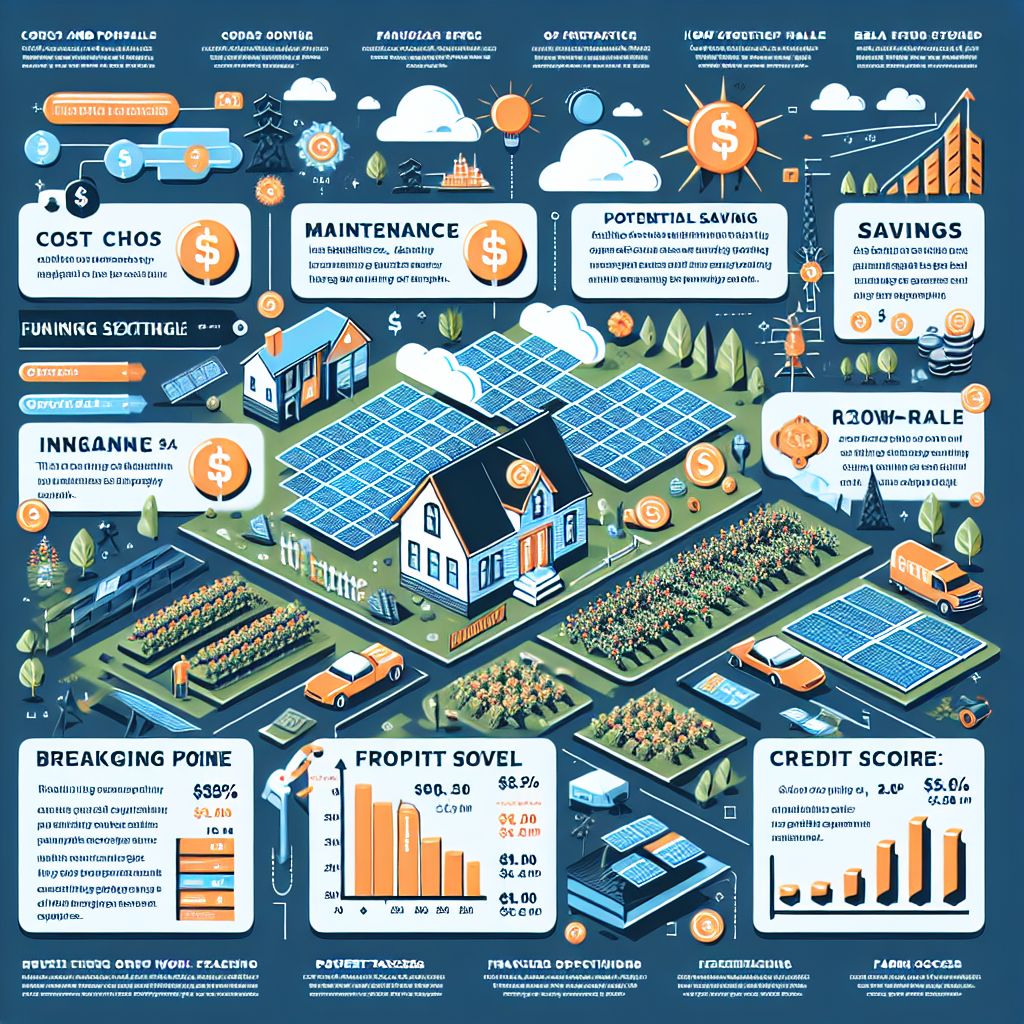
Important Financial Factors for Solar Panels
Looking at solar panel financing, don’t just consider the monthly payment. Think about all the possible costs and savings, like maintenance, insurance, and potentially higher property taxes because of the added value from the solar panels.
Additionally, think about how solar panels might affect the resale value of your farm. Although they might be a selling point for some buyers, not everyone is interested in assuming a solar lease or loan.
Figuring Out When You’ll Start Saving Money
One of the most important things you’ll need to figure out is when you’ll start saving money — when the amount you save on energy equals how much you spent on the solar panels. This depends on how much the system costs, how you’re paying for it, how much energy costs, and how much energy you’re getting from your solar panels.
Keep in mind, the ultimate aim is to save money over time, so it’s crucial to know when you’ll start reaping the benefits.
How Your Credit Score Affects Your Financing Choices
The financing options you have for your solar panel system are greatly influenced by your credit score. If you have a high credit score, you may be eligible for lower interest rates and more advantageous loan terms, potentially saving you thousands over the lifespan of your solar panel system. However, if your credit score is lower, you may be limited to more costly or less beneficial financing options.
So, before you start looking into financing, it’s a good idea to check your credit score and take steps to improve it if needed. This could give you access to better financing options and save you money.
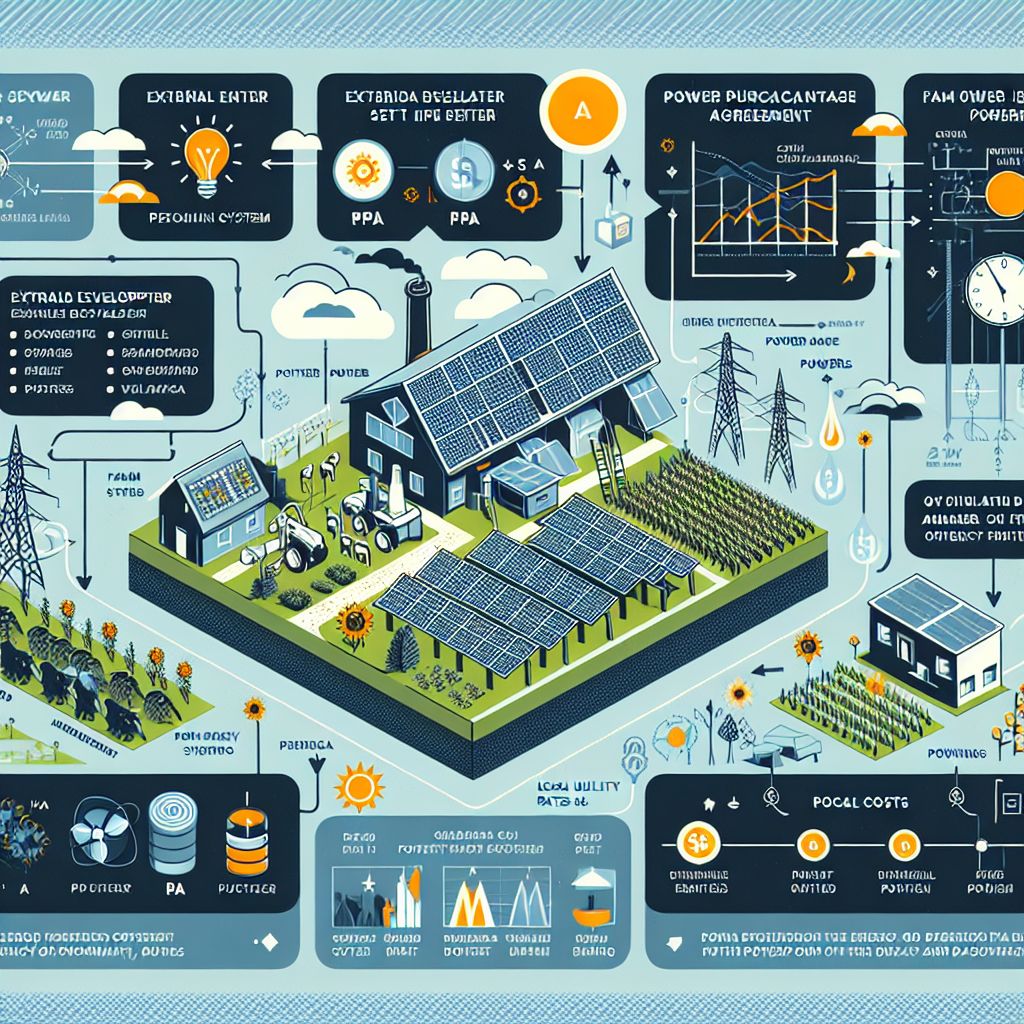
Power Purchase Agreements (PPAs): A Different Perspective
Power Purchase Agreements, also known as PPAs, provide a novel method for farms to utilize solar energy without the initial expense of buying or the ongoing obligations of leasing. In a PPA, an external developer sets up, possesses, and runs the solar panel system on your land. Your responsibility is to buy the power produced at a set price, which is frequently less than the rates charged by the local utility company.
This setup can be particularly appealing for farms, since it enables you to enjoy the advantages of solar power and possibly reduce your energy bills without having to oversee the system yourself. Additionally, because the developer is in charge of upkeep, you can concentrate on operating your farm without being concerned about additional operational duties.
The Difference Between PPAs and Leasing
PPAs and leasing are not the same. With leasing, you pay a fixed monthly fee to use the solar panel system. But with PPAs, you only pay for the power you use. So, your monthly costs can change based on how much power the system produces. Things like weather and the time of year can affect this.
Power Purchase Agreements (PPAs) can be a great option if your farm uses a lot of energy, because the price per kilowatt-hour (kWh) is often lower than the retail electricity rate. However, keep in mind that the rates for PPAs can increase over time, so you need to factor that in when you’re calculating the long-term financial effects.
How Energy Rates Can Affect Your Pocket
Your farm’s operating costs can be greatly influenced by the energy rates under a PPA. If your farm is located in an area where utility rates are high, securing a lower rate through a PPA can result in significant savings. However, it’s important to compare the PPA rate with your current and future projected utility rates to make sure it’s the best financial choice for your farm.
Final Thoughts
Selecting the appropriate solar panel financing option for your agricultural irrigation system is a significant decision that can have a long-term effect on your farm’s financial stability and sustainability. Each choice, whether it’s purchasing, leasing, or entering into a PPA, comes with its own set of advantages and factors to consider.
Purchasing demands a considerable initial outlay but delivers the greatest long-term savings and financial rewards. Leasing can result in instant savings without any upfront expenses, but it may provide less financial benefit over time. Solar loans strike a balance between immediate affordability and eventual ownership, while PPAs are a low-commitment method to lower energy expenses.
At the end of the day, the best decision will depend on your farm’s financial health, energy requirements, and future objectives. By thoroughly examining the benefits and drawbacks of each alternative and taking into account the important financial elements discussed, you can make a knowledgeable choice that will allow your farm to prosper in the future.
Putting the Sun to Work for Your Pocketbook
When you put solar panels on your farm, you’re not just going green. You’re making a smart financial decision. By understanding the different ways to finance solar panels and how they can affect your bottom line, you can use the power of the sun to drive your farm’s future success.
Common Questions
Will Financing Solar Panels Increase My Farm’s Resale Value?
Indeed, installing solar panels can boost your farm’s resale value. Prospective buyers may be enticed by the promise of lower energy costs and a farm that’s already outfitted with green energy technology. But, if the solar panels are leased or part of a PPA, it’s crucial to know how these agreements will be transferred in the event of a sale.
What Role Do Solar Incentives Play in Financing Decisions?
When you take into account solar incentives like tax credits, rebates, and grants, the overall cost of installing solar panels can be greatly reduced. Such incentives can make buying solar panels a more appealing option, since they can help you recoup your initial investment more quickly and increase your return on investment. When you’re weighing your financing options, it’s important to consider what incentives are available and how they could affect your decision.
What Happens to My Solar Panel Financing if I Decide to Move?
If you decide to move, what happens with your solar panel financing will depend on the type of financing you have. If you own the panels, you can sell them with the farm or potentially move them, although that could be expensive. If you have a lease or a power purchase agreement (PPA), you usually need to either transfer the agreement to the new owner or buy out the rest of the contract.
What Effect Does Solar Panel Financing Have On My Energy Bills?
Financing solar panels can result in decreased energy bills, since the price of solar energy is usually lower than conventional utility rates. As you pay down the financing over time, the savings can become even greater. It’s crucial to weigh the projected savings against your present and future energy costs to understand the real financial effect.
When considering the implementation of a solar panel system for farm irrigation, it’s important to understand the various financing options available. You can either buy the panels outright, lease them, or take out a loan. Each option has its own set of benefits and drawbacks, and the best choice depends on your specific circumstances and goals. For instance, buying solar panels can be more cost-effective in the long run, but it requires a significant upfront investment. Leasing can offer lower initial costs, but you may pay more over time and have less control over the system. Loans can balance the upfront cost and long-term ownership, but they add the complexity of interest rates and credit requirements. For a detailed comparison of these options, consider reading about buying, leasing, and loan options for solar panel financing on a farm.

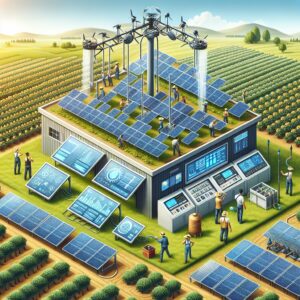
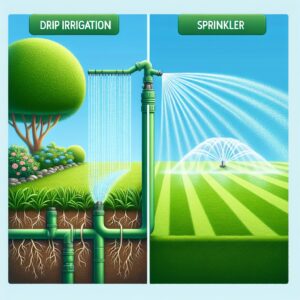
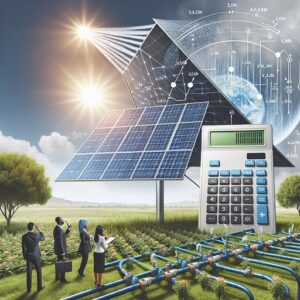
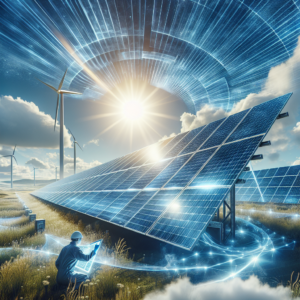
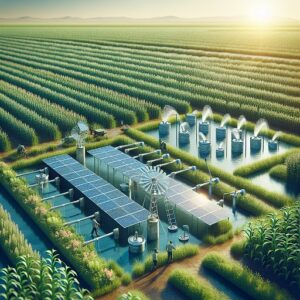
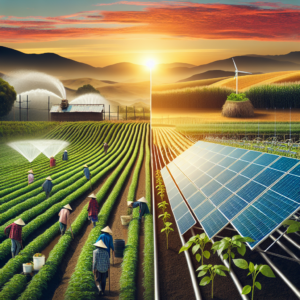
Leave a Reply